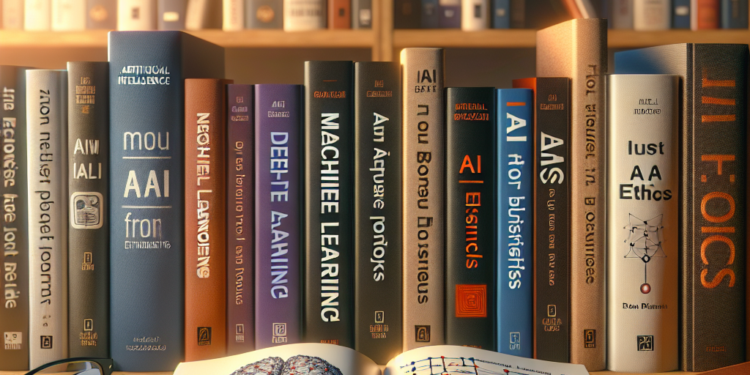Artificial intelligence (AI) is a rapidly growing field that is shaping the future of technology, business, and society as a whole. From self-driving cars to virtual assistants, AI is becoming increasingly integrated into our everyday lives. For enthusiasts looking to learn more about this exciting field, there are a plethora of books available that delve into the history, applications, and implications of artificial intelligence. In this article, we will explore some must-read AI books for enthusiasts who are eager to deepen their knowledge and understanding of this fascinating field.
1. “Superintelligence: Paths, Dangers, Strategies” by Nick Bostrom
In “Superintelligence,” philosopher Nick Bostrom examines the potential risks and benefits of developing artificial superintelligence. He explores scenarios in which AI surpasses human intelligence and discusses the ethical and existential implications of this possibility. This book is a must-read for anyone interested in the future of AI and its impact on society.
2. “Artificial Intelligence: A Guide for Thinking Humans” by Melanie Mitchell
In “Artificial Intelligence,” computer scientist Melanie Mitchell provides a comprehensive overview of AI and its various applications. She discusses the history and evolution of AI, as well as the challenges and limitations of current AI systems. This book is a great introduction to the field of artificial intelligence for beginners and enthusiasts alike.
3. “Machine Learning: A Probabilistic Perspective” by Kevin P. Murphy
“Machine Learning” by Kevin P. Murphy is a comprehensive textbook that covers the principles and techniques of machine learning from a probabilistic perspective. It provides a thorough introduction to the mathematical and statistical concepts behind machine learning algorithms, making it a valuable resource for enthusiasts looking to deepen their understanding of the field.
4. “Artificial Unintelligence: How Computers Misunderstand the World” by Meredith Broussard
In “Artificial Unintelligence,” journalist Meredith Broussard explores the limitations and misconceptions of artificial intelligence. She argues that AI systems are not as intelligent or autonomous as they are often portrayed to be, and that they are only as good as the data they are trained on. This book is a thought-provoking read for enthusiasts interested in the ethical and social implications of AI.
5. “Human Compatible: Artificial Intelligence and the Problem of Control” by Stuart Russell
In “Human Compatible,” AI researcher Stuart Russell examines the challenges of developing AI systems that are aligned with human values and interests. He argues that the key to creating beneficial AI is to ensure that it is safe, reliable, and aligned with human values. This book is a must-read for enthusiasts interested in the ethics and governance of artificial intelligence.
6. “The Master Algorithm: How the Quest for the Ultimate Learning Machine Will Remake Our World” by Pedro Domingos
In “The Master Algorithm,” computer scientist Pedro Domingos explores the quest for the ultimate learning machine. He argues that the key to creating powerful AI systems lies in developing a single, universal algorithm that can learn from any kind of data. This book is a fascinating exploration of the future of machine learning and its potential impact on society.
7. “Weapons of Math Destruction: How Big Data Increases Inequality and Threatens Democracy” by Cathy O’Neil
In “Weapons of Math Destruction,” mathematician Cathy O’Neil explores the dark side of big data and AI. She argues that algorithms can perpetuate inequality, discrimination, and social injustice, and that we need to be vigilant about the ethics and biases embedded in AI systems. This book is a thought-provoking read for enthusiasts interested in the social and political implications of artificial intelligence.
8. “Life 3.0: Being Human in the Age of Artificial Intelligence” by Max Tegmark
In “Life 3.0,” physicist Max Tegmark explores the future of artificial intelligence and its impact on humanity. He discusses the potential benefits and risks of advanced AI systems, as well as the ethical and philosophical questions they raise. This book is a must-read for enthusiasts interested in the existential implications of artificial intelligence.
9. “AI Superpowers: China, Silicon Valley, and the New World Order” by Kai-Fu Lee
In “AI Superpowers,” AI expert Kai-Fu Lee explores the global race for AI dominance between China and Silicon Valley. He examines the potential economic, political, and cultural implications of this competition, and argues that AI will shape the future of international relations. This book is a fascinating read for enthusiasts interested in the geopolitics of artificial intelligence.
10. “Deep Learning” by Ian Goodfellow, Yoshua Bengio, and Aaron Courville
“Deep Learning” is a comprehensive textbook that covers the fundamentals of deep learning, a subfield of machine learning that focuses on neural networks and algorithms inspired by the structure and function of the human brain. It provides a detailed introduction to the mathematical and computational principles of deep learning, making it an essential resource for enthusiasts interested in this cutting-edge technology.
In conclusion, these must-read AI books offer a broad and deep understanding of the history, applications, challenges, and implications of artificial intelligence. Whether you are a beginner looking to learn the basics of AI or an enthusiast eager to explore advanced topics in the field, these books will provide valuable insights and perspectives that will enhance your knowledge and understanding of this rapidly evolving field. Happy reading!













